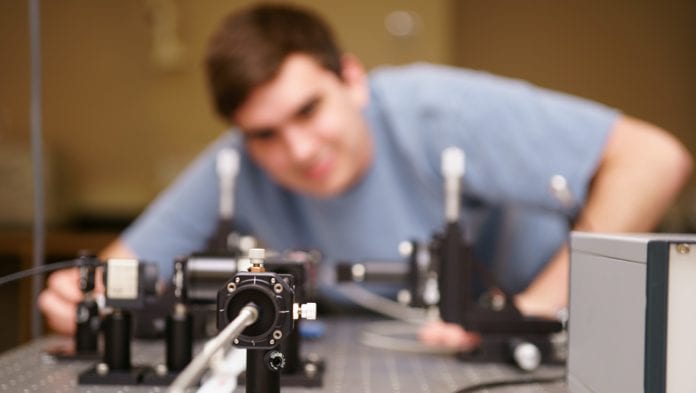Photo provided by Sarah Cannavino – Viverevita photography
Students participate in chemistry and physics research throughout the summer as part of research fellowship program
What’s the concentration of vitamins in orange juice? How can waste destruction processes be improved? What are the benefits (or lack of) in buying organic produce? Those are just a few of the research questions being tackled by sixteen students participating in Belmont’s Summer Undergraduate Research Fellowships, or SURFs, program.
Based on the vision of Chemistry and Physics Department Chair Dr. Robert Magruder and supported by six faculty members, SURFs offers a unique opportunity for students studying chemistry and physics to try their hand at a long-term research project. For some, the summer will be spent working on senior projects, a requirement for graduation. Other participants are continuing work thought up by their research advisor and project mentor.
Dean of the College of Sciences and Mathematics Dr. Thom Spence said SURFs came out of the desire to strengthen the undergraduate research culture at Belmont and allow students the opportunity to engage in research early in their collegiate careers. Designed to augment the established Summer Scholars Program which supports the research of 23 rising seniors in the Biology Department, the SURFs program affords students the opportunity to engage in research early in their collegiate careers. Emphasizing the difference between learning science and engaging with it, Spence said both aspects of a scientific education are vital to a student’s success.
“Engaging in a research project allows students to apply the knowledge they have gained in the classroom, which reinforces class content, and more importantly, serves as the bridge between areas within a discipline or even between disciplines,” Spence said. “No matter their career path, participating in undergraduate research helps students develop the creative and critical thinking skills they will need moving forward.”
For junior chemistry major Libby Ligon, the opportunity to participate in the SURF program was an obvious choice. Assigned to Dr. Spence’s physical chemistry research team, Ligon and her two partners are working to bring understanding to the Fenton Reaction, a process used to destroy carcinogens found in waste water. Ligon said she has already learned a great deal through working with her team, including the ability to solve problems collaboratively and creatively. With a dream to pursue a career in healthcare, Ligon said these skills are necessary.
 “This experience will give me a solid background in working as a member of a scientific research team as we strive toward a larger goal. I hope to one day become a physician where every single day I will be working with a team of healthcare professionals dedicated to a larger goal,” Ligon said. “This experience is teaching me so much more than a classroom could, providing me with real applications and deeper understanding of all of the chemistry I have learned in my classes thus far.”
“This experience will give me a solid background in working as a member of a scientific research team as we strive toward a larger goal. I hope to one day become a physician where every single day I will be working with a team of healthcare professionals dedicated to a larger goal,” Ligon said. “This experience is teaching me so much more than a classroom could, providing me with real applications and deeper understanding of all of the chemistry I have learned in my classes thus far.”
Sofia El Maliki, a senior chemistry major and pre-health emphasis, echoed Ligon’s experience. Spending the summer working with raspberry antioxidants to decide if buying organic is necessary for nutritional benefits, El Maliki said her biggest learning moment has been centered around failure – and welcoming it.
“I have learned that it takes a while to get to know the system you are working with and that you will fail several/many times before you become successful,” El Maliki said. “No matter how hard you try to avoid failure (which is what I tried to do), it will happen inevitably. But that’s part of the learning process, and it will make you a better chemist and critical thinker.”
Homepage image provided by Sarah Cannavino – Viverevita Photography



